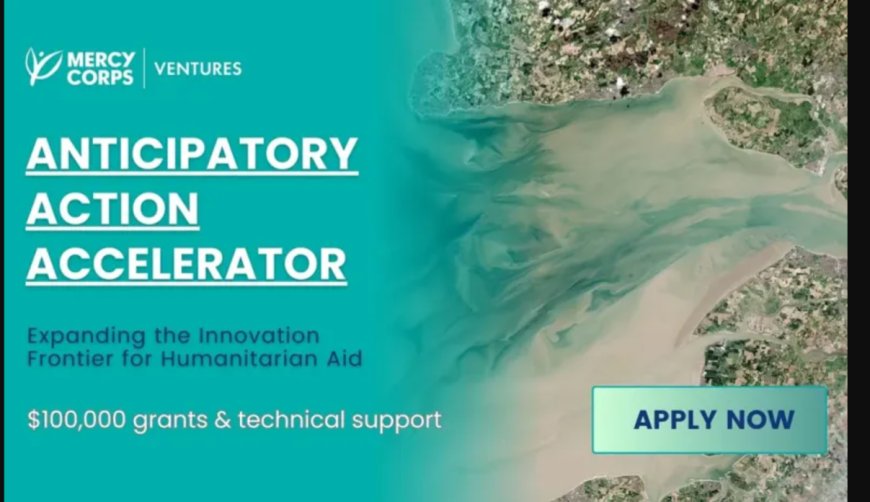Mercy Corps Ventures’ Humanitarian Venture Lab has launched the world’s first Anticipatory Action Accelerator.
Mercy Corps Ventures’ Anticipatory Action Accelerator uses AI, climate analytics, and crypto payments to proactively address climate crises. Offering $100K grants, the initiative aims to scale innovative solutions for vulnerable populations worldwide.

Mercy Corps Ventures’ Humanitarian Venture Lab has launched the world’s first-of-its-kind Anticipatory Action Accelerator. This initiative builds on recent Anticipatory Action (AA) pilots conducted in Kenya and Nepal. We aim to collaborate with startups, NGOs, and other stakeholders to usher in a new era of humanitarian aid by utilizing technological innovations, including climate data analytics, AI/ML, and cryptocurrency payment systems. Our goals include:
The Challenge.
Approximately 300 million individuals globally require humanitarian aid. In 2023, an allocation of USD 223.7 billion was set aside for assistance, equivalent to the annual GDPs of New Zealand, Portugal, and Qatar. Alarmingly, 99% of this aid is provided in response to crises only after adverse effects have been felt. As a result, merely 1% is invested in proactive measures to mitigate and manage risks. Yet, more than half of humanitarian crises are foreseeable, with 20% categorized as highly predictable. Studies indicate that anticipatory action—aid given before disasters—is seven times more cost-efficient than traditional humanitarian responses.
The Solution
A new wave of groundbreaking technological solutions transforms how we adapt to our evolving climate. Tools such as remote sensing, high-resolution satellite data, digital currencies, wallets, advanced climate analytics, and AI can enhance humanitarian aid delivery in markets impacted by conflict and climate change. It is essential to develop responsible solutions that meet the needs of the most vulnerable populations to bridge the technology gap.
Anticipatory Action takes the combined power of the above technologies to transform humanitarian aid. With the help of predictive analytics, experts can pre-emptively identify disasters by crunching data. Leveraging digital currencies, wallets, and payment rails, funders can swiftly respond to crises by directly delivering aid to those most likely to be affected. This facilitates better outcomes, including:
• High immediate and long-term ROI: Every dollar invested in anticipatory action generates $7 in benefits and avoided losses for households. Over a 20-year horizon, this benefit increases to $34, reducing long-term recovery needs and costs.
• Dignity and resilience for those affected by crisis: By preemptively providing unconditional cash support, we honor the needs of beneficiaries and uphold their dignity of choice, allowing them to determine the best use of the funds. Furthermore, anticipatory action empowers beneficiaries to plan and mitigate the impacts of emergencies rather than waiting for relief and rebuilding support after the crisis.
• Enhanced program efficiency and scalability: By utilizing a combination of remote sensing technology, high-quality satellite data, predictive analytics, and cutting-edge fintech, Anticipatory Action programs can effectively replicate and scale to assist the 300 million individuals in need of humanitarian aid globally, alongside the 3.6 billion people whose daily lives are at risk from disruptive climate events. Blockchain-powered AA can diminish transaction costs by over 90% and reduce transaction times by more than 75% compared to conventional methods.
About the Anticipatory Action Accelerator
The Anticipatory Action Accelerator centers on integrating advanced climate analytics, cryptocurrency payments, and humanitarian assistance. Together with our chosen partners, we strive to enhance the lives and livelihoods of underserved populations throughout the Global South.
This initiative is looking to collaborate with organizations in Africa, South and Southeast Asia, Latin America, the Caribbean, the Middle East, the Pacific Islands, and the Western Balkans that are testing Anticipatory Action solutions designed to refine humanitarian aid delivery.
Selected partners will receive equity-free grants of up to $100,000, contingent on meeting established milestones. In addition to funding, MCV will offer mentorship, advisory support on impact measurement, access to partnership opportunities, knowledge sharing, and enhanced brand visibility.
About Mercy Corps Ventures
Mercy Corps Ventures (MCV), the impact investment branch of Mercy Corps—a 501c3 international development agency active in over 40 countries—has executed 50+ equity investments that bridge climate resilience and innovative technology, enhancing the lives of low-income individuals in emerging markets. Beyond the Anticipatory Action Accelerator, MCV’s Venture Lab oversees several initiatives, including AI for Climate Resilience, the Climate Tech Facility, and the Crypto For Good Fund. The Venture Lab has evaluated over 1,000 proposals, introduced 20+ solutions, and allocated over $3 million in funding, benefiting over 40,000 lives. Applications are reviewed regularly, so applying early will help you stand out. The application deadline is February 14, 2025.
Webinar
If you would like to learn about the Anticipatory Action Accelerator, join our webinar on Thursday, January 30th, at 9 a.m. EST/ 2 p.m. CET.
Register here for the webinar
Learn more at www.mercycorpsventures.vc; if you have further questions, please contact Sandra Hart (MCV’s Humanitarian Lab Lead) at sahart@mercycorps.org
 Kinyarwanda
Kinyarwanda
 English
English









































































